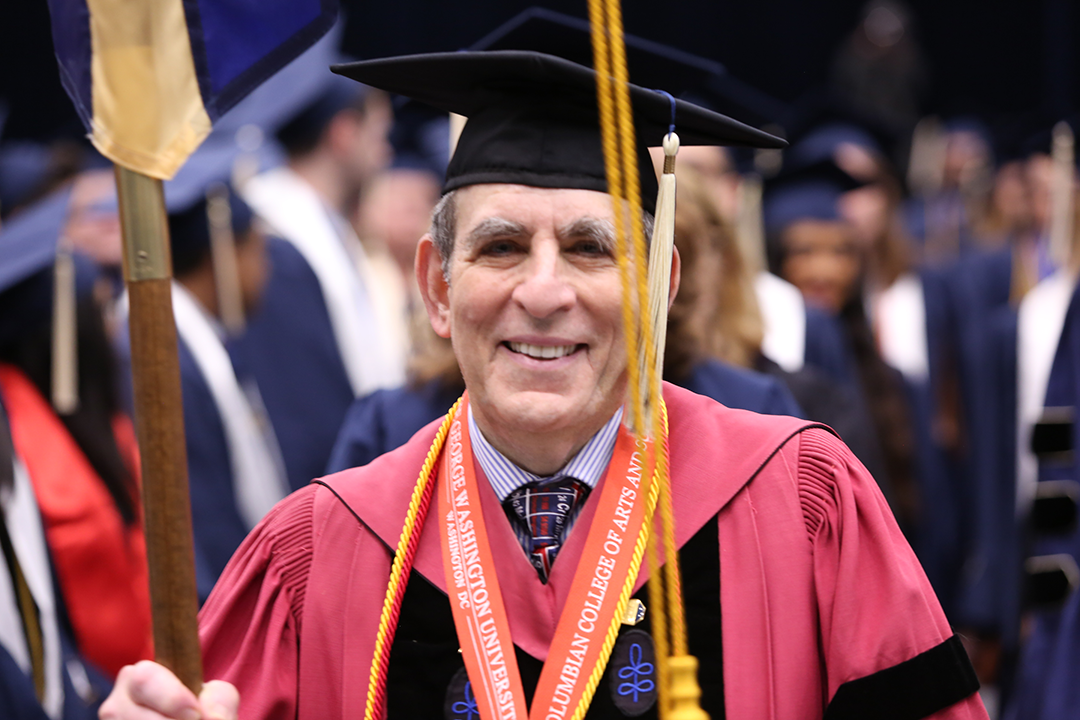Since 1973, Professor of Chemistry Michael King has been a fixture on the Foggy Bottom campus. You could find him working at his desk, even if you stopped by at 6 in the morning or on Sunday afternoons. You could see him in his organic chemistry lab, first in the basement of Corcoran Hall and later in Science & Engineering Hall (SEH), as he diagrammed molecular structures on the whiteboard walls. And for the last 25 years, King was regularly garbed in a cap and crimson gown at CCAS Celebrations, leading the processional of graduates as the college’s marshal.
A dedicated teacher and mentor, and an instrumental figure in bringing SEH to fruition, King retired from teaching at the end of the 2019-20 academic year. During nearly half a century at GW, he served under four university presidents and 12 Columbian College deans; chaired the Department of Chemistry for more than 20 years, from 1996 to 2019; and taught so many organic chemistry courses that he frequently saw the children of former students in his class.
“All of us who worked with Dr. King were impressed by his level of commitment to the college, his colleagues and his students,” said CCAS Dean Paul Wahlbeck. “On a personal level, he shares a special connection to my family. In the 1960’s, when Michael was an undergraduate at the Illinois Institute of Technology, my father taught him in an introductory class on physical chemistry. Because Michael went on to do great things within the discipline, I like to think my dad played a big role in sparking his passion for science—or at least that’s the family lore!”
A Teacher, First and Foremost
Among his many hats, King said he always saw himself first and foremost as a teacher. His mother was a teacher—“Maybe it was in the genes,” he laughed—and even in elementary school, he tutored his classmates in math and science.
“One of the really special parts of being a teacher is the hope that you made a little bit of a difference in someone’s life,” King said. “It is humbling to talk to students and alumni and know that I played a small part in their GW experience.”
When King first came to GW, Columbian College was about a third of its current size. The smaller classes allowed him to form his own teaching philosophy when interacting with students. “I’ve always told my colleagues that the critical thing about teaching is getting into your students’ heads to figure out what they don’t understand,” he explained. “That’s how you help them overcome the distance between the material and their way of thinking.”
That could prove difficult with his specialty, organic chemistry. The study of the structure and properties of organic compounds, the discipline has a reputation as a notoriously difficult branch of science—and a “weed out” course for would-be chemistry majors. King was drawn to it while studying for his PhD at Harvard University under Nobel Prize-winning chemist R.B. Woodward, who famously synthesized compounds like quinine. Rather than “weeding-out” students with grinding coursework, King shared his talent for visualizing the way molecules interact—a skill he passed on to several former students who forged their own chemistry careers in academia and science.
“Professor King radiated authentic enthusiasm in sharing his knowledge, joy and the wonder of chemistry in the classroom and beyond,” said Peter Scholl, BS ’86, now a research chemist at the Food and Drug Administration. Tracy A. Schoolcraft, BS ’86, the associate provost at Shippensburg University in Pennsylvania, described King as “the type of professor who wanted you to learn, and we learn a lot more when we are taught by professors like him who demonstrate that they care.”
To many of his colleagues, King left his greatest legacy during his two decades as department chair. In addition to being instrumental in the design and completion of SEH, King doubled the size of the department’s faculty and championed the work of his chemistry colleagues, noted Professor of Chemistry and International Affairs Christopher Cahill, the current chair of the Chemistry Department. “He was a fearless leader of the department and a tireless advocate for the faculty,” Cahill said. Whether securing equipment and endowments or nominating faculty for awards, Cahill said King was known for prioritizing his department’s accomplishments over his own. “Michael always said, ‘Your success is my success.’ He created a culture of collegiality and respect in the department that is a model for the whole school.”
Although he will no longer be teaching, King is looking forward to remaining involved in research activities at the university. Over the years, he has seen organic chemistry move away from synthesizing theoretically interesting molecules toward more direct applications in areas like disease therapies—a scientific path he’s anxious to explore. “It's an exciting time for this field,” he said.
Still King says he’ll miss his classes and seeing students each day. In what colleagues like Cahill call his “typical humble fashion,” he said nothing to his last class about his retirement. “I preferred a quiet disappearance from the scene rather than making a splash in the classroom,” he said. “But did I feel a certain sentimentality in those last classes? Grading exams for the last time? Well, I’m only human.”


